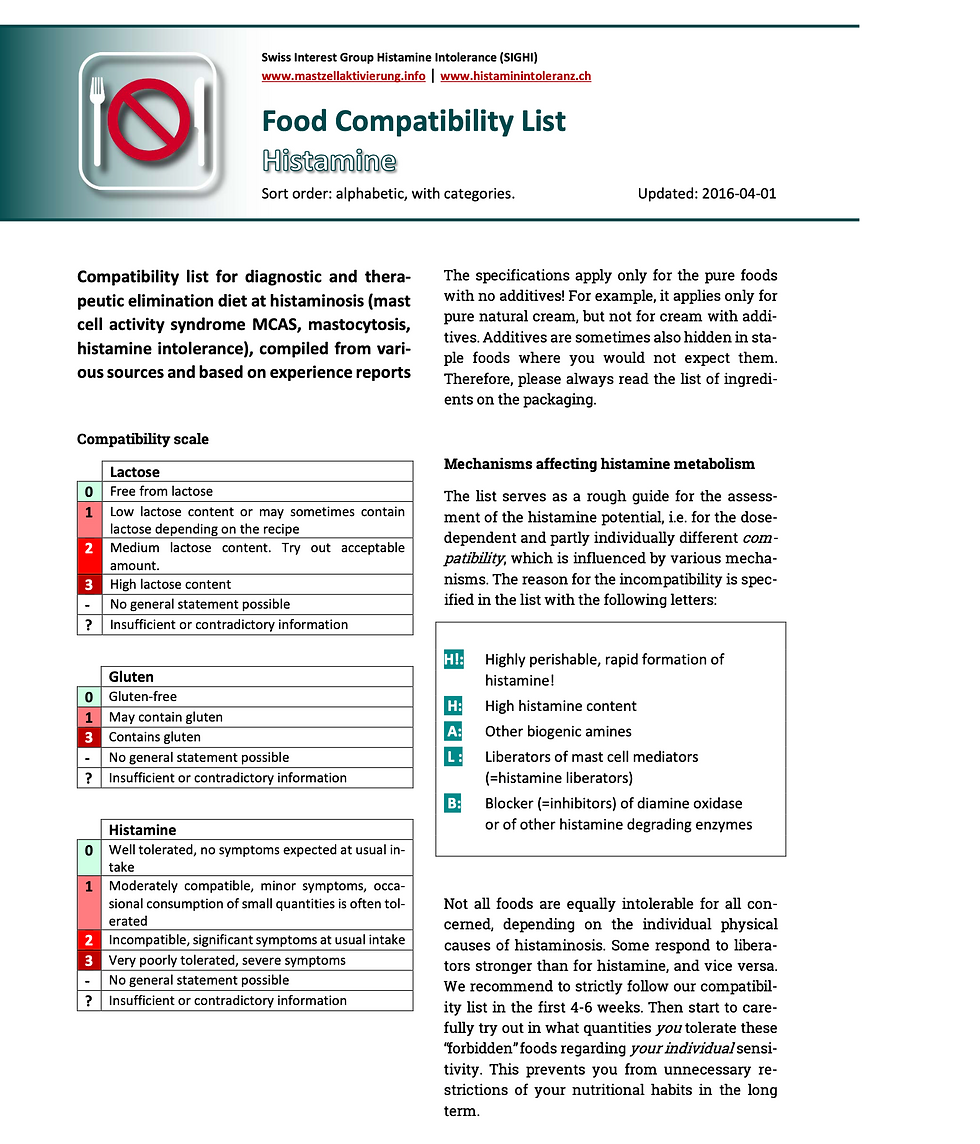SIBO and Histamine
- Donna Kay Franklin
- Jan 26, 2021
- 6 min read
Histamine intolerance is really common in SIBO sufferers.
Histamine is a chemical released by our body’s immune system in response to an injury, infection or foreign substance in the body. Histamine kicks off an inflammatory response that helps increase blood flow and white blood cells to infected or injured areas of the body. When your immune system is functioning optimally, histamine can be helpful.
But, histamine becomes a problem child when your immune system becomes dysregulated. A good example of this immune dysregulation is allergies.
The immune system starts to overreact to benign substances like they are foreign invaders -

such as dogs, cats, pollen, certain foods and the other common allergens. Your immune system turns into an overprotective parent and tries to protect you from substances that you don’t need to be protected from.
When the immune system stimulates your MAST cells to release histamine in response to an allergen, you can experience a runny/stuffy nose, itchiness, rashes, sneezing and difficulty breathing. Popular allergy meds are anti-histamines that help decrease the amount of histamine being released by your cells to reduce allergy symptoms.

Since 80% of your immune system resides in the gut, it is not surprising that an inflamed and imbalanced gut can lead to an increase release of histamine. Gut imbalances can lead to histamine intolerance.
In this blog, I want to highlight why you may struggle with histamine and SIBO and what you can do about it.
Why SIBO can lead to high histamine levels in the gut?
Inflammation and intestinal permeability (aka Leaky Gut) in the gut can cause an overactive immune response and an increased release of histamine


Bacteria can produce histamine. You could have an overgrowth of bacteria that produces histamine leading to higher histamine levels.
Diamine Oxidase (DAO) is an enzyme that breaks down histamine. It is produced in the small intestines. Inflammation and damage can hinder the production of DAO enzymes. With an inability to break down histamine, your histamine levels will rise.
MAST cell activation disorder occurs when the mast cells unstable and release histamine chronically. There is a strong connection between MAST cell activation and SIBO

Below is a simple chemistry demonstration video to show you how DAO works in your body and neutralizes histamine.
.
Two other factors why your histamine levels could be elevated:
You can also have a genetic predisposition to higher histamine levels. A recent study found that variants in DAO genes strongly influence expression and activity of the DAO enzyme. Meaning that some individuals may be genetically prone to producing less DAO, which could be a risk factor for higher histamine levels.
The human DAO gene, which codes for the DAO enzyme, is located in chromosome 7q34-q36. Three common non-synonymous SNPs, which bring about the amino acid substitutions Thr16Met (rs10156191), Ser332Phe (rs1049742) and His645Asp (rs1049793) have been identified in Caucasian individuals, and the functional effects of these SNPs in enzyme activity have been studied in detail. Recently an additional promoter, SNP rs2052129 (G4586T), which seems to cause decreased transcriptional activity, has been described.
The good news is that your genes are not your destiny. The researchers found that genetic variance alone was not significantly associated with histamine intolerance. They hypothesize that histamine intolerance usually results from a blend of genetic AND environmental factors. Remember, you can fine tune your genetic expression by changing the environment your cells live in. A healthy lifestyle and diet can help with this.
Having gut imbalances and these genes could create a perfect storm that leads to histamine intolerance.
For women, estrogen promotes histamine release from mast cells and a down-regulation of DAO production. If you struggle with estrogen dominance (which is common with gut imbalances), this hormone could be driving an elevation in histamine. If estrogen is a culprit, you will typically notice more histamine reactions around ovulation (mid-cycle) or right before menstruation, including severe cramping.
Histamine in Foods
If you have underlying issues that are raising histamine levels in the body, consuming foods that are high in histamines can aggravate symptoms. This reaction to high histamine foods is usually referred to as histamine intolerance.
Foods that contain histamines or increase the release of histamines can cause problems for those with histamine problems. Typical symptoms of histamine intolerance are:
headaches/migraines
sinus congestion, sneezing or runny nose
itchiness on skin or in throat
rashes, flushing or hives
diarrhea
nausea
GI cramping
tissue swelling

Above is a 19 page PDF listing an assortment of foods and how they may trigger you. Its best to use this as a general guide to help you root out the offending foods. What triggers one person, may not trigger another. Please send me a message with your email address and I will send it to you if you would like a copy for yourself, as I have not figured out how to upload it successfully yet to the blog.
There are tons of foods that contain histamine. The most common culprits for histamine reactions are fermented foods (kombucha, wine, beer, yogurt, kim chi, sauerkraut, vinegars etc), cured meats, aged cheeses and dried fruits. If you have high histamine levels, these can add more fuel to the fire.

There are also long lists on the internet of foods to avoid when you have histamine issues. In most cases, complete dietary restriction of histamine foods is unnecessary. Even if you are intolerant to some histamines, usually you will have a threshold level of histamine foods that you can tolerate.
Plus, to really control histamines, you need to address the root cause factors that are driving the levels up.
Tips to Address Histamine Intolerance
Treat your SIBO
As I described above, SIBO can drive inflammation in the gut and increase histamine levels. If untreated, SIBO can keep histamine levels chronically elevated.
Clearing the SIBO can help qualm the histamine storm. It is also important that you address root causes of your SIBO so that it doesn’t return.
Balance the Gut
After you clear the SIBO, restoring balance in the gut is key. Usually people with SIBO have large intestine imbalances that can drive inflammation, intestinal permeability and poor immune function. All of which can drive high histamine release.
Using properly timed probiotic and prebiotic strategies can help with histamine intolerance. It is key that you are choosing strains that are histamine free or histamine degrading to prevent aggravation of symptoms.
Reduce inflammation in the gut
Reducing over activation of the immune system can help reduce histamine intolerance. Endotoxin in the gut can often lead to chronic immune activation and inflammation in the gut.
Endotoxin binders can help reduce inflammation in the gut by binding to toxins before our immune system reacts to them. Binders allow the immune system to calm down and re-calibrate. Reduced immune activation will reduce histamine release.
Some supplements some are using is: IgG supplements like MegaIgG2000 or SBI Protect to bind to endotoxins for reducing inflammation in the gut.

Stress Management is key
Stress activates the HPA axis and raises cortisol levels. This stress response will also cause mast cells to release histamine. Therefore, staying out of fight or flight can help stabilize mast cells and keep histamine levels in check.
The following slides come from INFLAMMATION: Gallbladder and we will be discussing these in length in that paper, video and slides.




Meditation and diaphragmic breathing techniques to help increase your body’s resilience to stress. Getting adequate sleep and sunshine is also important.
DAO enzymes can help reduce histamines in the gut
Diamine oxidase is the enzyme that breaks down histamine. You can supplement with DAO enzymes to help increase the breakdown of histamine from foods you are eating.
DAO enzymes can help you reduce the symptoms of histamine intolerance. These enzymes can also increase your ability to tolerate more histamine containing foods. For woman with histamine issues due to estrogen spikes, DAO enzymes can be taken around ovulation and before your period to help blunt symptoms.
It is important to mention that these enzymes are for symptom management while you address the underlying issues causing the histamine issues. These shouldn’t be taken long term.
Increase intake or supplement with nutrients that stabilize mast cells

Selenium, vitamin C, and vitamin A, have been shown to stabilize mast cells to reduce histamine release. Spices like ginger and tumeric are also good mast cell stabilizers.
Supplementing with quercetin can also be helpful. I like Quicksilver Scientific’s Hist-Aid blend of nutrients to support lower histamine levels, which includes vitamin C and quercetin.


Aswe've talking about healing histamine and mast cell issues, avoiding the big histamine foods can be helpful if you have histamine related issues, but trying to avoid them all can be stressful.
Histamine intolerance is a spectrum and most people can tolerate some histamine foods. It’s all about finding what histamine foods trigger you and the threshold level of histamine that you can tolerate.

Your histamine issues are rooted in immune dysfunction and poor gut health. Focusing more of your energy on fixing the gut and subsequent immune dysfunction will result in less histamine reactions.
In Conclusion:
High histamine levels are common with SIBO. High histamine foods are not usually the problem when you have SIBO, but they can aggravate the symptoms. For long term relief from histamine issues, you need to treat and repair the gut vs trying to avoid all histamine containing foods.
Another paper that compliments this one and is extremely informative is Histamine: The Good, Bad, and How to Fix it.
Love and Light,
Happy Healing
Another complimenting paper/video/slides is: INFLAMMATION:SIBO
https://www.mastoqueen.com/single-post/inflammation-sibo
.jpg)











Comments